By Gabrielle Isabel Kelenyi, on behalf of the Writing Center’s Antiracism Standing Committee, and featuring Dean Eric Wilcots
Writing happens. It happens everywhere and all the time, even when we’re not writing an essay. Furthermore, writing is important because we use it to communicate important ideas and information, to express ourselves, to make the particular more universal, to reach out and connect with one another. Especially in these socially distant times, writing is an important way for us all to teach, to exchange ideas, to accomplish our tasks and goals, to metaphorically touch one another. Whether we’re conscious of it or not, we spend a lot of time writing for various audiences and various purposes, and the Writing Center wants to celebrate all the writing we do as worthy and important.
One of the ways we’ve sought to do this is by sharing more ways of writing and more reasons for writing with the wider campus community. And upon learning about writers writing from departments across campus, it is our hope that more people will be able to see themselves as writers, too. Through gathering faculty writing profiles for cultural heritage months and developing them into social media posts, the Writing Center has aimed to showcase the wide range of writing processes and strategies that work for writers and normalize the idea that everyone’s process is unique. Shining a light on specific communities of writers and writing can help other members of those communities see themselves as writers more clearly and help elucidate the value of writing in their lives and aspirations.
For Black History Month, in addition to faculty members, we also featured university administrators who use writing in unique ways to communicate information, connect with campus stakeholders, and write for large, diverse audiences (see gallery below for some recent posts).
As the dean of the College of Letters & Science at UW–Madison and an astronomer, Eric Wilcots is well-positioned to reflect on the role of writing in his professional life. We invite you to read on for his complete responses to the questions that we posed to him recently. We believe that Dean Wilcots’ perspective as both a university administrator and a scientific writer is unique and has the potential to widen conceptions of writers and writing on campus and beyond, and to help the Writing Center continue its mission of strengthening the culture of writing at UW–Madison and amplifying the voices of Black students, faculty, and staff.
An Interview with Dean Eric Wilcots of the College of Letters & Science
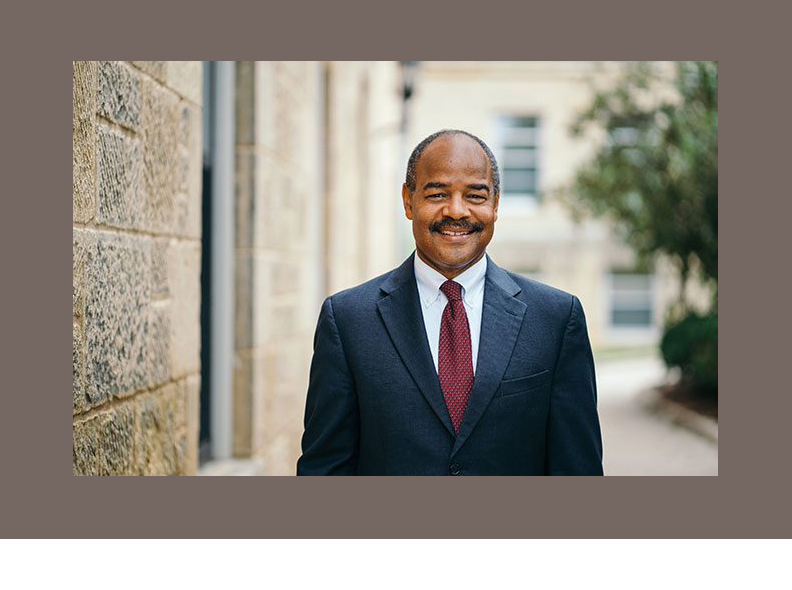
What role does writing play in your personal and/or professional life?
Writing is an integral part of what I do as a professional astronomer, a faculty member, and as Dean of the College of Letters & Science. One of the classes I regularly taught before becoming Dean was Astronomy 236, “The History of Matter in the Universe.” While the subject matter is absolutely fascinating, the core mission of the course was to allow my students to explore various forms of scientific writing. The central “textbook” was a compilation of scientific writing called “Galileo’s Commandment.” That title arises from the idea that while Galileo did not invent the telescope and was, probably, not the first person to point a telescope at the sky, he was certainly the first person to point a telescope at the sky and write down what he saw. This is the foundation of all scientific professions; we are obligated not just to carry out our research, but, most importantly, to write about our research as a means of advancing knowledge. As a professional astronomer, I have co-authored dozens of peer-reviewed papers that are in scientific journals such as The Astronomical Journal or The Astrophysical Journal and made contributions to conferences that have also been published. Additionally, I have co-authored a number of studies commissioned by the National Academies.
One of the more pleasurable aspects of writing in the context of being a faculty member has been writing letters of recommendation for my students who are applying to everything from summer internships to graduate schools to jobs in the private sector to faculty positions at other institutions. Faculty write a lot of letters!
Since becoming the Dean of the College of Letters & Science, I have been called upon to write for a wide range of audiences. Communication is an enormously important component of this role, and I am grateful that L&S has an outstanding Strategic Communications team. With their help I write messages to alumni, students, and faculty and staff (I hope you’ve seen some of these). I also write pieces for our bi-annual magazine as well as our annual “Fueling Discovery” supplement in the Wisconsin State Journal.
How would you describe your writing process and/or yourself as a writer?
I need to hear the idea and the rough structure of the piece in my mind before I can effectively write it down. Even my scientific writing usually starts as “hearing” the concepts first. The ideas do need to marinate in my mind for a bit, but at the right moment, the actual writing is natural. I will not call it “easy” (as it never is), but the ideas flow more readily after I have thought about them for awhile. Once the concepts are first expressed as words “on paper,” I can iterate and polish, almost always with the help of collaborators.
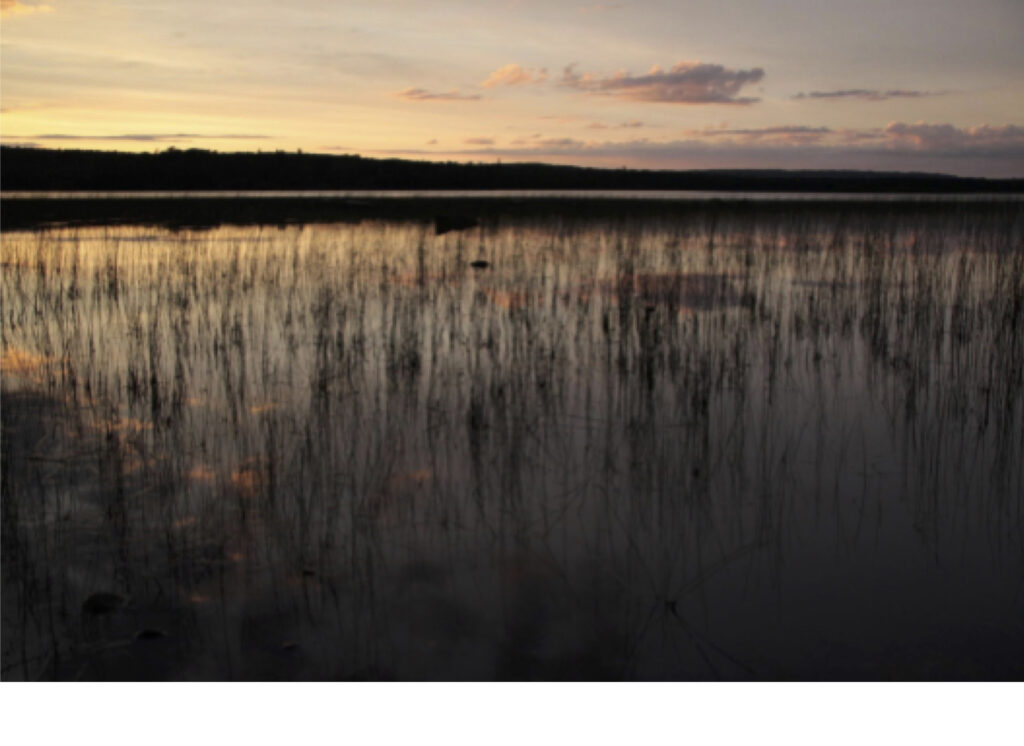
An implication of this is that I need space to let my mind form the concepts, ideas, and words: hence, the picture blow. This photograph was taken on the shores of a lake in northern Minnesota last summer. It is not to say that I only write at sunset and by a lake; it is to symbolize that the writing process, at least for me, best begins with an opportunity to let my mind work on ideas. Those moments can arise very pleasantly by a lake in the summer or take place in my office at my desk when I stop looking at email or responding to texts.
What writing tips or strategies would you recommend to student writers—either in general and/or in your specific field?
The advice I give my students is never to let the opportunity for writing go by. Polishing and editing can come later, but it is very important to get the concepts in your head written down. For one thing, you won’t forget them! I have seen a number of students in my classes who feel that they cannot start writing until they have the entire assignment figured out. I think it is more effective to write the ideas as they come to you.
Thank you, Dean Wilcots, for allowing us to share your full responses with a larger audience and for giving us all a glimpse into why and how you write!
And thank you, readers, for taking a moment to read about how and why others write within and beyond the university. We hope that these insights and experiences help writers who come across them recognize the beauty in their own writing processes and inspire new ways into writing. And we hope, in the words of Dean Wilcots, that these writing reflections galvanize members of our writing community to “never let the opportunity to write go by.”
Members of the Writing Center’s Antiracism Standing Committee, including Gabrielle Isabel Kelenyi, Lisa Marvel Johnson, Dorothy Mayne, Emily Hall, and Nancy Linh Karls collaborated on this post. You can see more faculty writing profiles for Black History Month and other cultural heritage months (from last semester and in the future) by visiting the Writing Center’s Instagram, Twitter, and Facebook pages.


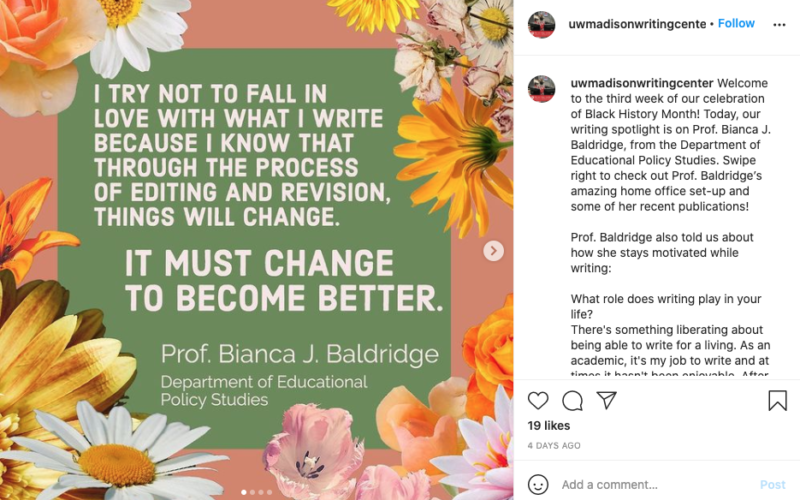
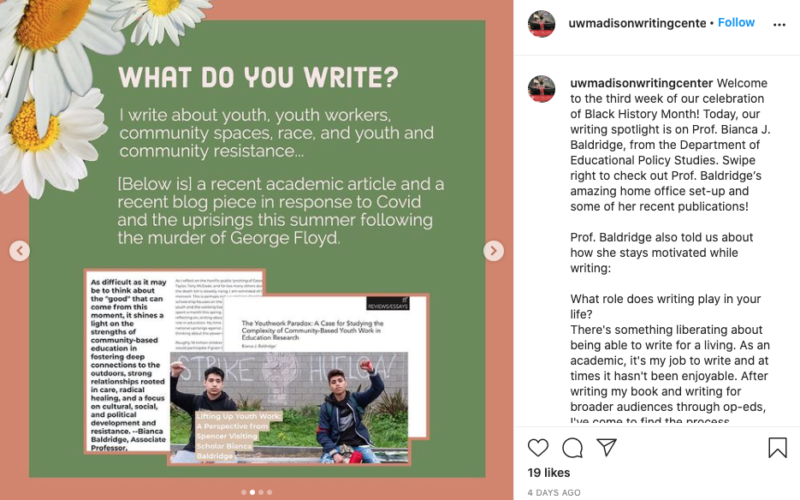

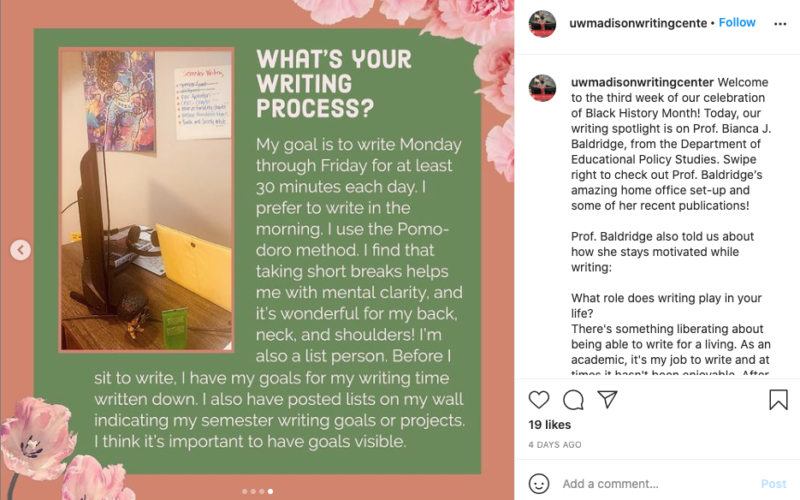

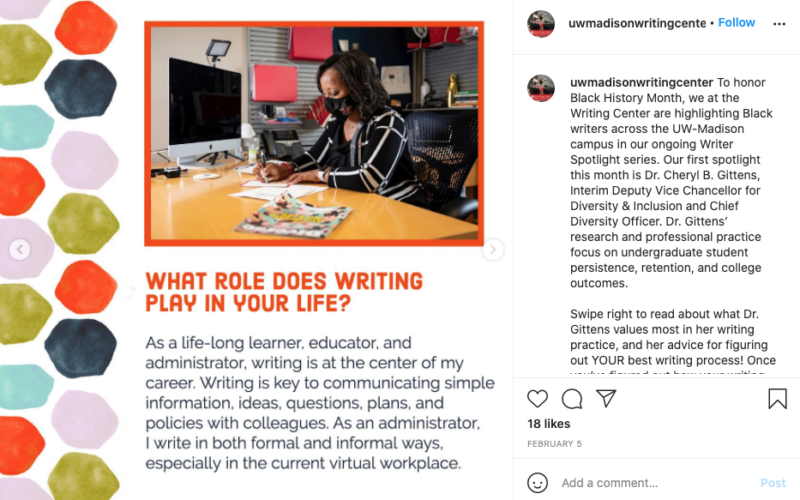
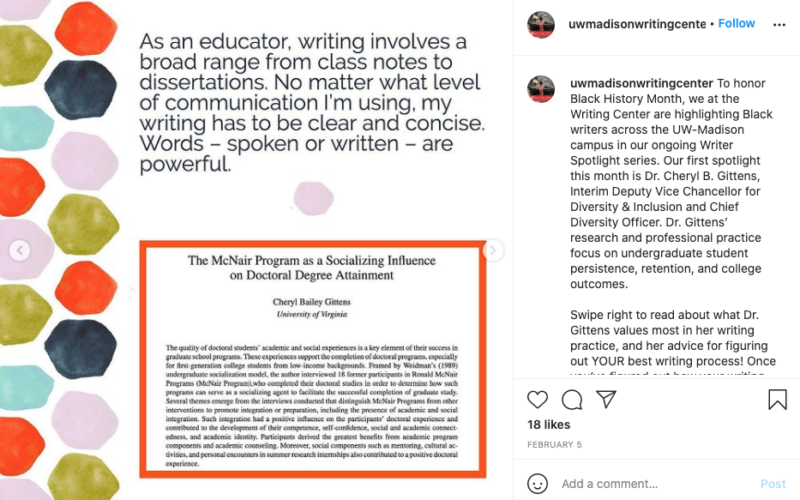

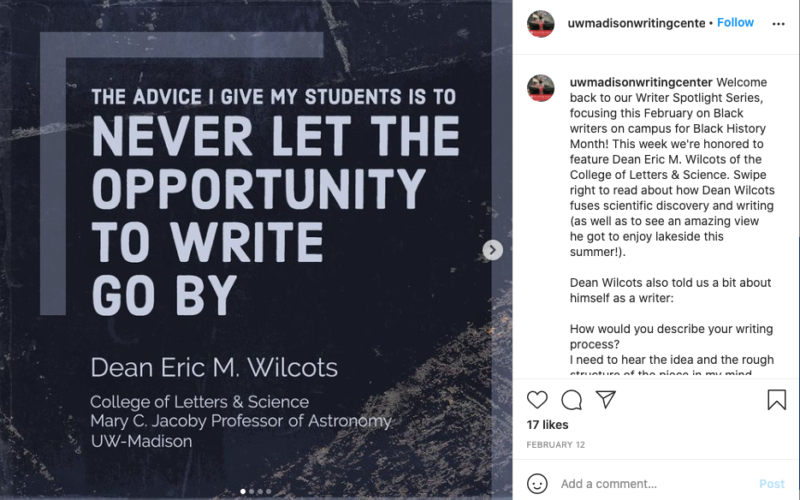



The advice I give my students is never to let the opportunity for writing go by.
This line was spot on!! Thanks for sharing.
Thank you so much, Dean Wilcots. I have learnt a lot with this article.